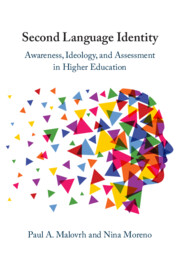Book contents
- Second Language Identity
- Second Language Identity
- Copyright page
- Dedication
- Contents
- Figures
- Tables
- Preface
- Acknowledgments
- 1 On Actors, Architecture, and L2 Advancedness in Higher Education
- Part I Advancedness and the L2 Learner
- 2 Advancedness, Advanced Proficiency, and L2-Spanish Learner Identity
- 3 A Quantitative Analysis of L2 Learners’ Beliefs Regarding Advanced L2-Spanish and Their Perceptions of Advancedness
- 4 Can L2 Learners Imagine Advancedness?
- Part II Variable Notions of Advancedness
- Part III Assessment, Identity, and Critical Language Awareness As Markers of Advancedness
- Book part
- Bibliography
- Name Index
- Subject Index
4 - Can L2 Learners Imagine Advancedness?
A Qualitative Study of Language Awareness and the Development of L2 Identity
from Part I - Advancedness and the L2 Learner
Published online by Cambridge University Press: 27 July 2023
- Second Language Identity
- Second Language Identity
- Copyright page
- Dedication
- Contents
- Figures
- Tables
- Preface
- Acknowledgments
- 1 On Actors, Architecture, and L2 Advancedness in Higher Education
- Part I Advancedness and the L2 Learner
- 2 Advancedness, Advanced Proficiency, and L2-Spanish Learner Identity
- 3 A Quantitative Analysis of L2 Learners’ Beliefs Regarding Advanced L2-Spanish and Their Perceptions of Advancedness
- 4 Can L2 Learners Imagine Advancedness?
- Part II Variable Notions of Advancedness
- Part III Assessment, Identity, and Critical Language Awareness As Markers of Advancedness
- Book part
- Bibliography
- Name Index
- Subject Index
Summary
The present chapter set out to complement the quantitative analyses in Chapter 3 with more qualitative analyses of L2 learners’ beliefs and assessment of advancedness. We analyzed the different metalinguistic descriptors they produced to describe their beliefs and other speakers’ actual use of language, its content, manner, and the L2 speaker’s identity. We found that our L2 learners were only partially explicitly aware of the language, the content, and the manner exhibited by our L2 speakers, but that they were implicitly sensitive to categorically different levels of intercultural competence among different L2 speakers. We concluded that our L2 listeners could only partially imagine L2 advancedness, and we hypothesized that the lack of a full understanding of advancedness, operationalized as a lack of language awareness, could inhibit their ability to develop an L2 identity. Consequently, we call for future research to examine how institutional intervention, through curricular design or student advising, may help to make students more explicitly aware of the multifaceted nature of advancedness, as well its empowering effect on their identity and agency as an L2 speaker.
Keywords
- Type
- Chapter
- Information
- Second Language IdentityAwareness, Ideology, and Assessment in Higher Education, pp. 62 - 90Publisher: Cambridge University PressPrint publication year: 2023



